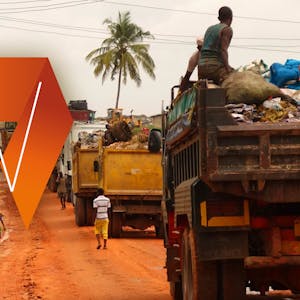Explore the complexities of municipal solid waste management in low- and middle-income countries with the "Municipal Solid Waste Management in Developing Countries" course. Gain a deep understanding of the technical, environmental, social, financial, and institutional elements of waste management systems. Learn about sustainable solutions and case studies that offer practical insights into waste management and recycling.
Key elements covered in this course include waste generation and characterization, waste collection and transport, recycling, waste disposal, governance aspects, organic waste treatment, special waste fractions, and strategic issues and planning.
Certificate Available ✔
Get Started / More Info
This course is divided into 10 modules covering topics such as physical elements of solid waste management, governance aspects, organic waste treatment, special waste fractions, and strategic waste planning. Each module offers in-depth insights and practical knowledge, ensuring a comprehensive understanding of municipal solid waste management in developing countries.
Module 1 delves into the physical elements of solid waste management, covering topics such as waste generation and characterization, recycling, waste collection and transport, and waste disposal. It also provides essential information for success in the course and offers suggested readings and peer interaction opportunities.
Module 2 provides lesson choices related to the physical elements of solid waste management, offering additional depth and flexibility in learning about waste management practices and techniques.
Module 3 focuses on governance aspects of solid waste management, addressing policies and legislation, the roles of public and private sectors, integrating the informal sector, public awareness campaigns, financing mechanisms, and community participation. It also includes bonus content and supplementary resources.
Module 4 offers lesson choices related to governance aspects of solid waste management, allowing learners to explore specific governance-related topics in greater detail.
Module 5 centers on organic waste treatment, covering biowaste treatment technologies, composting, anaerobic digestion, vermicomposting, and thermochemical conversion of biomass. It also includes bonus content, spotlight videos, and additional resources.
Module 6 provides lesson choices related to organic waste treatment, allowing learners to focus on specific aspects of biowaste management and treatment technologies.
Module 7 addresses special waste fractions, including mixed waste treatment, hazardous waste management, healthcare waste management, e-waste, plastic waste management, and construction and demolition waste. It also includes bonus content and additional resources on marine plastic waste.
Module 8 offers lesson choices related to special waste fractions, providing learners with the opportunity to explore specific topics related to the management of diverse and challenging waste fractions.
Module 9 explores strategic issues and planning in solid waste management, covering biowaste management, municipal solid waste management planning, waste and climate change, sustainable development goals, waste flow diagram, circular economy, and technology selection. It also includes key messages, slides, and suggested readings.
Module 10 provides lesson choices related to strategic issues and planning in solid waste management, allowing learners to focus on specific strategic and planning-related topics within the context of waste management in developing countries.
Aeroecology: Exploring Biodiversity with Radar introduces the revolutionary use of radar in studying airborne life forms, providing essential skills for biodiversity...
Geodesign: Change Your World is a comprehensive course that empowers learners to tackle complex challenges through innovative geospatial strategies.
Sustainable Urban Water Systems explores modern solutions for urban water management, focusing on stormwater control, water supply strategies, and the integration...
Climate Solutions provides a comprehensive understanding of climate change and offers practical steps for addressing the crisis, empowering individuals to make a...